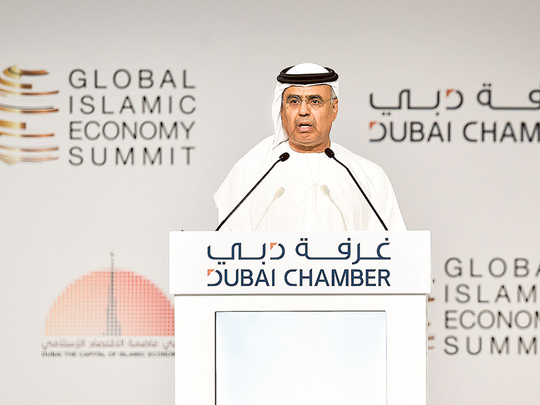
Dubai: In the face of a global slowdown, and declining oil prices, the Global Islamic Economy Summit (GIES) provides an opportunity to exchange expertise on sustainable development model that could benefit communities and create jobs, Obaid Al Tayer, minister of state for financial affairs, federal government of the United Arab Emirates said on Tuesday.
In his address to thousands of local and foreign delegates attending the third GIES, Al Tayer stressed the importance of Islamic economy, and the key role that the UAE has played in coming out various rules and legislations to preserve its global status.
“Sustainable development and achieving economic stability requires us to work hard inorder to find a unified effective and advanced financial system inorder to guide investments in an ideal manner as per basis that are flexible in providing financial services that meet the aspiration of investors and individuals,” Al Tayer said.
As the biggest highlight, even in the throes of the great financial crises in 2008, the Islamic economy witnessed strength in facing repercussions of the event. Economic activities that are in line with Islamic Sharia have shown to be the most capable of growth, and enduring economic pressure because it is characterised by features that are absent in traditional methods, Al Tayer said.
He stressed the need for a global regulatory framework for Islamic financial activities developed by the Islamic banking industry, a move that could pave the way for overcoming the differences arising regionally and internationally.
Unify:
And even regionally, the GCC is looking at advanced levels of economic integration based on common economic agreement signed in 2001.
“It is important to unify laws and criteria related to Islamic financing transactions and in a what that complements growth achieved by Islamic economy and Islamic banks operating in the GCC and in order to enhance their competitiveness in the global financial market,” Al Tayer said.
It will also be based on a number of laws and legislations that ensures the free movement of capital, risk management and sound financial planning and the effective management of investments, he added. Such systems are sorely needed by the global economy in light of fluctuations witnessed in commodities and financial markets across the world.
The UAE was one of the first country in the region to adopt policies and procedures such as medium general financial framework and zero based budget and liberalising oil prices in addition to a number of draft laws such as the bankruptcy law, and federal debt.
The UAE has worked to create a strong financial system that is based on strong foundation and legislations that attract investments and capital. The UAE financial system, despite the consecutive global economic crises, showed its capabilities and flexibilities in avoiding its effects and repercussions of these crises.












